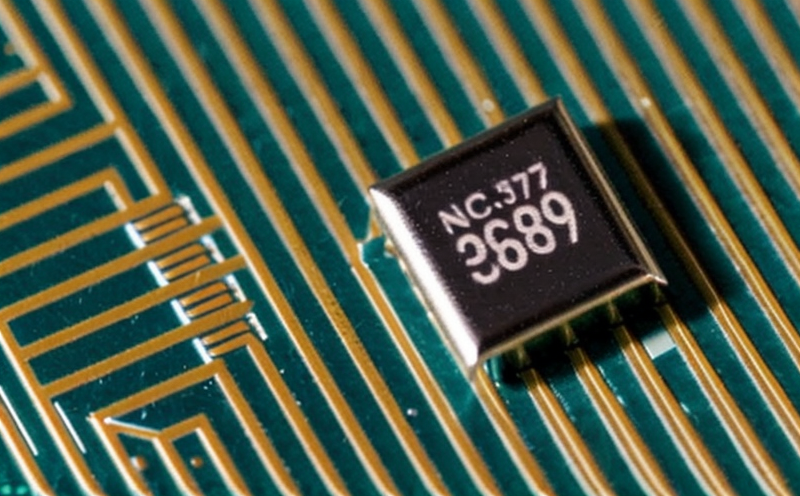JEDEC JESD22-A129 Microchip Power Dissipation Testing
The JEDEC JESD22-A129 microchip power dissipation test is a critical process in the semiconductor industry that ensures the reliability and lifetime of integrated circuits (ICs). This test evaluates how much heat a chip can dissipate without failing, which directly impacts its performance, durability, and operational lifespan. The JESD22-A129 standard specifies conditions under which microchips are subjected to power dissipation stress for extended periods to simulate real-world operating environments.
The JEDEC JESD22-A129 test is essential because it helps manufacturers identify potential thermal issues early in the design and manufacturing processes, thereby reducing costly product recalls and warranty claims. By simulating high-power conditions, this testing ensures that microchips meet stringent reliability requirements set by industry standards.
The test is particularly important for high-performance processors, power management chips, and other components where heat generation can significantly affect performance and longevity. The JESD22-A129 standard requires the use of specific thermal chambers that simulate real-world operating conditions, including temperature ranges from -40°C to +150°C.
During testing, microchips are subjected to various power levels over extended periods. This process helps engineers understand how the chip behaves under extreme conditions and allows for optimizations in design and manufacturing processes. The test results provide critical data on the thermal performance of the chip, which is essential for ensuring compliance with industry standards.
The testing process involves precise control of environmental factors such as temperature, humidity, and airflow to ensure accurate replication of real-world operating environments. Additionally, the test chamber must be capable of maintaining these conditions within tight tolerances to provide reliable data.
After completing the JEDEC JESD22-A129 test, engineers analyze the results to determine whether the chip meets specified performance criteria. If any issues are identified during testing, further modifications or redesigns may be necessary before proceeding with mass production. This rigorous testing process is crucial for maintaining high standards of quality and reliability in semiconductor manufacturing.
The JEDEC JESD22-A129 microchip power dissipation test plays a vital role in ensuring that electronic devices operate reliably under extreme conditions. By simulating real-world operating environments, this test helps identify potential thermal issues early in the design phase, reducing costly product failures and warranty claims.
The test is particularly important for high-performance processors, power management chips, and other components where heat generation can significantly affect performance and longevity. The JESD22-A129 standard requires the use of specific thermal chambers that simulate real-world operating conditions, including temperature ranges from -40°C to +150°C.
During testing, microchips are subjected to various power levels over extended periods. This process helps engineers understand how the chip behaves under extreme conditions and allows for optimizations in design and manufacturing processes. The test results provide critical data on the thermal performance of the chip, which is essential for ensuring compliance with industry standards.
The testing process involves precise control of environmental factors such as temperature, humidity, and airflow to ensure accurate replication of real-world operating environments. Additionally, the test chamber must be capable of maintaining these conditions within tight tolerances to provide reliable data.
After completing the JEDEC JESD22-A129 test, engineers analyze the results to determine whether the chip meets specified performance criteria. If any issues are identified during testing, further modifications or redesigns may be necessary before proceeding with mass production. This rigorous testing process is crucial for maintaining high standards of quality and reliability in semiconductor manufacturing.
Benefits
- Ensures compliance with industry standards such as JESD22-A129
- Identifies potential thermal issues early in the design phase
- Maintains high standards of quality and reliability in semiconductor manufacturing
- Reduces costly product failures and warranty claims
- Optimizes design and manufacturing processes for better performance and longevity
- Promotes reliability under extreme operating conditions
- Ensures long-term stability and durability of microchips
Quality and Reliability Assurance
- The JEDEC JESD22-A129 test is essential for ensuring that microchips meet stringent reliability requirements set by industry standards.
- This testing process helps identify potential thermal issues early in the design phase, reducing costly product failures and warranty claims.
- By simulating real-world operating environments, this test ensures accurate replication of environmental factors such as temperature, humidity, and airflow.
- The test chamber must be capable of maintaining these conditions within tight tolerances to provide reliable data.
- Engineers analyze the results to determine whether the chip meets specified performance criteria. If any issues are identified during testing, further modifications or redesigns may be necessary before proceeding with mass production.
Competitive Advantage and Market Impact
The JEDEC JESD22-A129 microchip power dissipation test provides a competitive advantage by ensuring that products meet the highest standards of reliability and quality. This rigorous testing process sets a benchmark for performance and longevity, which is critical in today's fast-paced technological landscape.
By adhering to industry standards such as JESD22-A129, companies can demonstrate their commitment to delivering high-quality products that meet the demands of global markets. This reputation translates into increased customer confidence and loyalty, ultimately driving business growth and success.
The test also helps manufacturers stay ahead of regulatory changes and emerging trends in the semiconductor industry. By staying current with these developments, companies can ensure they remain competitive and relevant in an ever-evolving market landscape.
Moreover, compliance with JESD22-A129 standards enhances a company's reputation as a leader in quality and reliability, which is increasingly important for maintaining long-term relationships with key customers. This recognition not only boosts brand value but also opens doors to new opportunities within the industry.





